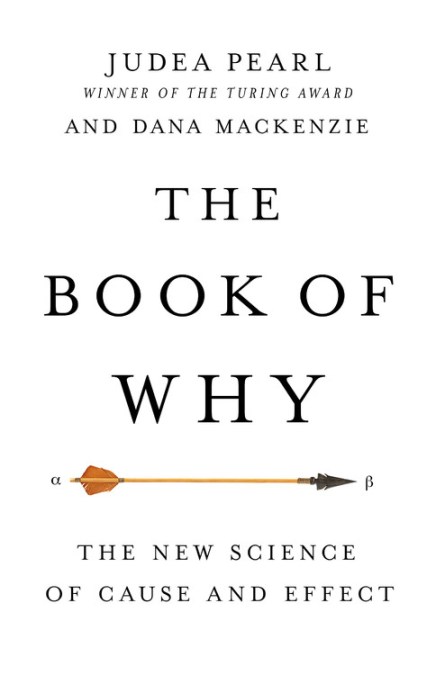THE BOOK OF WHY: The New Science of Cause and Effect
A Turing Prize-winning computer scientist and statistician shows how understanding causality has revolutionized science and will revolutionize AI.
 THE BOOK OF WHY:
THE BOOK OF WHY:The New Science of Cause and Effect,
by Judea Pearl and Dana Mackenzie.
May 2018.
"Correlation is not causation."
For over a century, this seemingly reasonable dictum of statistics metastasized into one of science's biggest obstacles, as researchers in all data-driven disciplines became unwilling to say if one thing caused another. But all this has changed with Judea Pearl and his colleagues, whose work over the past three decades has cut through the confusion and established causality-the study of cause and effect-on a firm scientific basis. His work shows how we know simple things, like whether the rain or a sprinkler made a sidewalk wet, as well as how we can answer hard questions, like whether a drug cured an illness.
Coauthored with the PhD mathematician turned science writer Dana Mackenzie, THE BOOK OF WHY reveals the far-reaching effects of scientific revolution that is transforming the fields of statistics, epidemiology, cognitive science, and the social sciences, and that will be central to advances in the next generation of artificial intelligence.
In the book, Pearl and Mackenzie explore:
- Why scientists failed for so long to develop a scientific language for expressing cause and effect.
- How over the past decades Pearl and others have developed methods for determining causal relationships, thereby more closely mimicking what the human brain can do.
- How causal models can now be built to answer questions such as
1) How likely is it that man-made global warming caused this heat wave?
2) Does this gene cause lung cancer directly or by predisposing people to smoke more?
3) What is the effect of a job training program on salary? - The problems with randomized control trials, and how causal models can offer an alternative way of determining cause and effect when such trials are impossible or too expensive.
- How despite the hubbub about Big Data and "deep learning systems," any real advances in artificial intelligence will require us to teach machines to think in terms of cause and effect. Intelligent machines can and should be taught causal reasoning as a prerequisite to ethical behavior and collaboration with humans.
